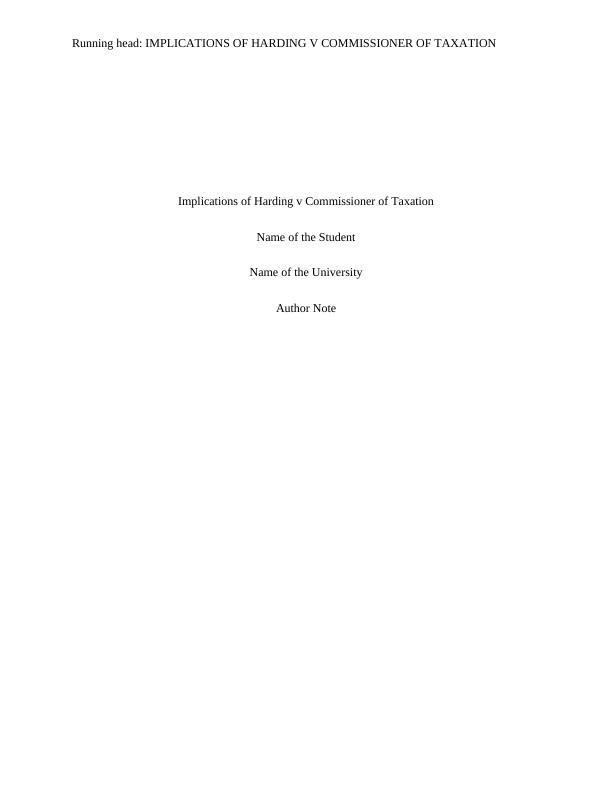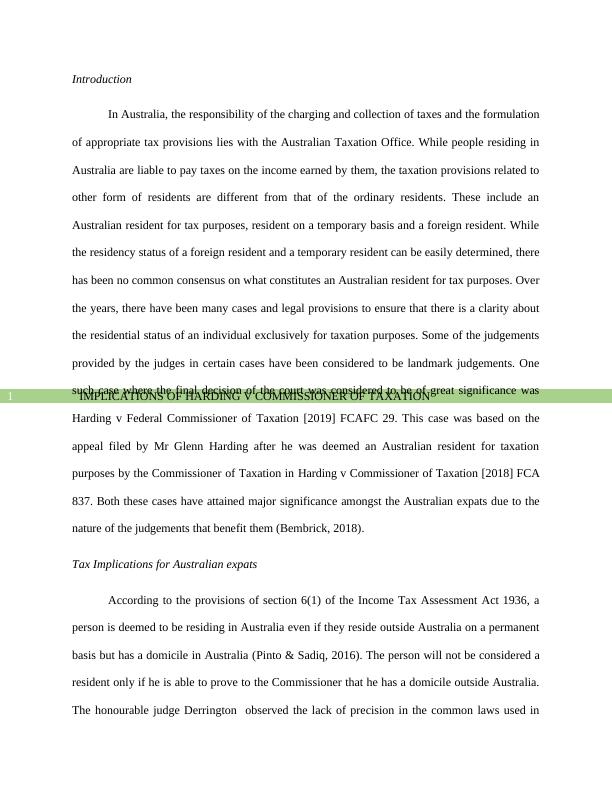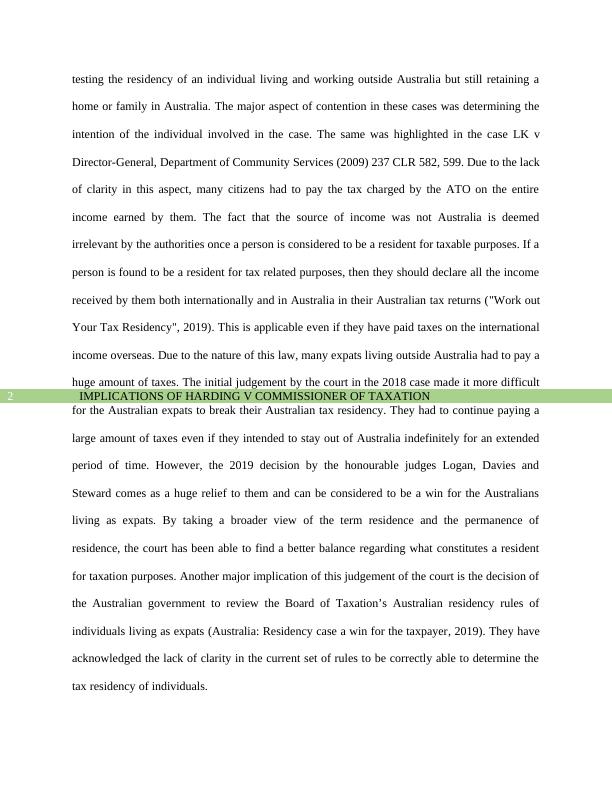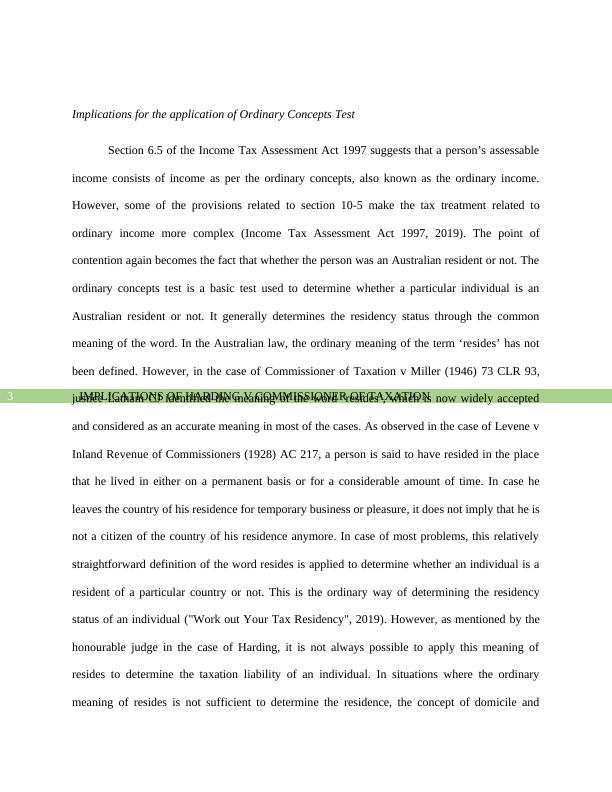Implications of Harding v Commissioner of Taxation Assessment 2022
Discuss the implications of the judgements in the Harding v Commissioner of Taxation and Harding v Federal Commissioner of Taxation cases.
12 Pages2539 Words31 Views
Added on 2022-09-17
Implications of Harding v Commissioner of Taxation Assessment 2022
Discuss the implications of the judgements in the Harding v Commissioner of Taxation and Harding v Federal Commissioner of Taxation cases.
Added on 2022-09-17
ShareRelated Documents
Running head: IMPLICATIONS OF HARDING V COMMISSIONER OF TAXATION
Implications of Harding v Commissioner of Taxation
Name of the Student
Name of the University
Author Note
Implications of Harding v Commissioner of Taxation
Name of the Student
Name of the University
Author Note

IMPLICATIONS OF HARDING V COMMISSIONER OF TAXATION1
Introduction
In Australia, the responsibility of the charging and collection of taxes and the formulation
of appropriate tax provisions lies with the Australian Taxation Office. While people residing in
Australia are liable to pay taxes on the income earned by them, the taxation provisions related to
other form of residents are different from that of the ordinary residents. These include an
Australian resident for tax purposes, resident on a temporary basis and a foreign resident. While
the residency status of a foreign resident and a temporary resident can be easily determined, there
has been no common consensus on what constitutes an Australian resident for tax purposes. Over
the years, there have been many cases and legal provisions to ensure that there is a clarity about
the residential status of an individual exclusively for taxation purposes. Some of the judgements
provided by the judges in certain cases have been considered to be landmark judgements. One
such case where the final decision of the court was considered to be of great significance was
Harding v Federal Commissioner of Taxation [2019] FCAFC 29. This case was based on the
appeal filed by Mr Glenn Harding after he was deemed an Australian resident for taxation
purposes by the Commissioner of Taxation in Harding v Commissioner of Taxation [2018] FCA
837. Both these cases have attained major significance amongst the Australian expats due to the
nature of the judgements that benefit them (Bembrick, 2018).
Tax Implications for Australian expats
According to the provisions of section 6(1) of the Income Tax Assessment Act 1936, a
person is deemed to be residing in Australia even if they reside outside Australia on a permanent
basis but has a domicile in Australia (Pinto & Sadiq, 2016). The person will not be considered a
resident only if he is able to prove to the Commissioner that he has a domicile outside Australia.
The honourable judge Derrington observed the lack of precision in the common laws used in
Introduction
In Australia, the responsibility of the charging and collection of taxes and the formulation
of appropriate tax provisions lies with the Australian Taxation Office. While people residing in
Australia are liable to pay taxes on the income earned by them, the taxation provisions related to
other form of residents are different from that of the ordinary residents. These include an
Australian resident for tax purposes, resident on a temporary basis and a foreign resident. While
the residency status of a foreign resident and a temporary resident can be easily determined, there
has been no common consensus on what constitutes an Australian resident for tax purposes. Over
the years, there have been many cases and legal provisions to ensure that there is a clarity about
the residential status of an individual exclusively for taxation purposes. Some of the judgements
provided by the judges in certain cases have been considered to be landmark judgements. One
such case where the final decision of the court was considered to be of great significance was
Harding v Federal Commissioner of Taxation [2019] FCAFC 29. This case was based on the
appeal filed by Mr Glenn Harding after he was deemed an Australian resident for taxation
purposes by the Commissioner of Taxation in Harding v Commissioner of Taxation [2018] FCA
837. Both these cases have attained major significance amongst the Australian expats due to the
nature of the judgements that benefit them (Bembrick, 2018).
Tax Implications for Australian expats
According to the provisions of section 6(1) of the Income Tax Assessment Act 1936, a
person is deemed to be residing in Australia even if they reside outside Australia on a permanent
basis but has a domicile in Australia (Pinto & Sadiq, 2016). The person will not be considered a
resident only if he is able to prove to the Commissioner that he has a domicile outside Australia.
The honourable judge Derrington observed the lack of precision in the common laws used in

IMPLICATIONS OF HARDING V COMMISSIONER OF TAXATION2
testing the residency of an individual living and working outside Australia but still retaining a
home or family in Australia. The major aspect of contention in these cases was determining the
intention of the individual involved in the case. The same was highlighted in the case LK v
Director-General, Department of Community Services (2009) 237 CLR 582, 599. Due to the lack
of clarity in this aspect, many citizens had to pay the tax charged by the ATO on the entire
income earned by them. The fact that the source of income was not Australia is deemed
irrelevant by the authorities once a person is considered to be a resident for taxable purposes. If a
person is found to be a resident for tax related purposes, then they should declare all the income
received by them both internationally and in Australia in their Australian tax returns ("Work out
Your Tax Residency", 2019). This is applicable even if they have paid taxes on the international
income overseas. Due to the nature of this law, many expats living outside Australia had to pay a
huge amount of taxes. The initial judgement by the court in the 2018 case made it more difficult
for the Australian expats to break their Australian tax residency. They had to continue paying a
large amount of taxes even if they intended to stay out of Australia indefinitely for an extended
period of time. However, the 2019 decision by the honourable judges Logan, Davies and
Steward comes as a huge relief to them and can be considered to be a win for the Australians
living as expats. By taking a broader view of the term residence and the permanence of
residence, the court has been able to find a better balance regarding what constitutes a resident
for taxation purposes. Another major implication of this judgement of the court is the decision of
the Australian government to review the Board of Taxation’s Australian residency rules of
individuals living as expats (Australia: Residency case a win for the taxpayer, 2019). They have
acknowledged the lack of clarity in the current set of rules to be correctly able to determine the
tax residency of individuals.
testing the residency of an individual living and working outside Australia but still retaining a
home or family in Australia. The major aspect of contention in these cases was determining the
intention of the individual involved in the case. The same was highlighted in the case LK v
Director-General, Department of Community Services (2009) 237 CLR 582, 599. Due to the lack
of clarity in this aspect, many citizens had to pay the tax charged by the ATO on the entire
income earned by them. The fact that the source of income was not Australia is deemed
irrelevant by the authorities once a person is considered to be a resident for taxable purposes. If a
person is found to be a resident for tax related purposes, then they should declare all the income
received by them both internationally and in Australia in their Australian tax returns ("Work out
Your Tax Residency", 2019). This is applicable even if they have paid taxes on the international
income overseas. Due to the nature of this law, many expats living outside Australia had to pay a
huge amount of taxes. The initial judgement by the court in the 2018 case made it more difficult
for the Australian expats to break their Australian tax residency. They had to continue paying a
large amount of taxes even if they intended to stay out of Australia indefinitely for an extended
period of time. However, the 2019 decision by the honourable judges Logan, Davies and
Steward comes as a huge relief to them and can be considered to be a win for the Australians
living as expats. By taking a broader view of the term residence and the permanence of
residence, the court has been able to find a better balance regarding what constitutes a resident
for taxation purposes. Another major implication of this judgement of the court is the decision of
the Australian government to review the Board of Taxation’s Australian residency rules of
individuals living as expats (Australia: Residency case a win for the taxpayer, 2019). They have
acknowledged the lack of clarity in the current set of rules to be correctly able to determine the
tax residency of individuals.

IMPLICATIONS OF HARDING V COMMISSIONER OF TAXATION3
Implications for the application of Ordinary Concepts Test
Section 6.5 of the Income Tax Assessment Act 1997 suggests that a person’s assessable
income consists of income as per the ordinary concepts, also known as the ordinary income.
However, some of the provisions related to section 10-5 make the tax treatment related to
ordinary income more complex (Income Tax Assessment Act 1997, 2019). The point of
contention again becomes the fact that whether the person was an Australian resident or not. The
ordinary concepts test is a basic test used to determine whether a particular individual is an
Australian resident or not. It generally determines the residency status through the common
meaning of the word. In the Australian law, the ordinary meaning of the term ‘resides’ has not
been defined. However, in the case of Commissioner of Taxation v Miller (1946) 73 CLR 93,
justice Latham CJ identified the meaning of the word ‘resides’, which is now widely accepted
and considered as an accurate meaning in most of the cases. As observed in the case of Levene v
Inland Revenue of Commissioners (1928) AC 217, a person is said to have resided in the place
that he lived in either on a permanent basis or for a considerable amount of time. In case he
leaves the country of his residence for temporary business or pleasure, it does not imply that he is
not a citizen of the country of his residence anymore. In case of most problems, this relatively
straightforward definition of the word resides is applied to determine whether an individual is a
resident of a particular country or not. This is the ordinary way of determining the residency
status of an individual ("Work out Your Tax Residency", 2019). However, as mentioned by the
honourable judge in the case of Harding, it is not always possible to apply this meaning of
resides to determine the taxation liability of an individual. In situations where the ordinary
meaning of resides is not sufficient to determine the residence, the concept of domicile and
Implications for the application of Ordinary Concepts Test
Section 6.5 of the Income Tax Assessment Act 1997 suggests that a person’s assessable
income consists of income as per the ordinary concepts, also known as the ordinary income.
However, some of the provisions related to section 10-5 make the tax treatment related to
ordinary income more complex (Income Tax Assessment Act 1997, 2019). The point of
contention again becomes the fact that whether the person was an Australian resident or not. The
ordinary concepts test is a basic test used to determine whether a particular individual is an
Australian resident or not. It generally determines the residency status through the common
meaning of the word. In the Australian law, the ordinary meaning of the term ‘resides’ has not
been defined. However, in the case of Commissioner of Taxation v Miller (1946) 73 CLR 93,
justice Latham CJ identified the meaning of the word ‘resides’, which is now widely accepted
and considered as an accurate meaning in most of the cases. As observed in the case of Levene v
Inland Revenue of Commissioners (1928) AC 217, a person is said to have resided in the place
that he lived in either on a permanent basis or for a considerable amount of time. In case he
leaves the country of his residence for temporary business or pleasure, it does not imply that he is
not a citizen of the country of his residence anymore. In case of most problems, this relatively
straightforward definition of the word resides is applied to determine whether an individual is a
resident of a particular country or not. This is the ordinary way of determining the residency
status of an individual ("Work out Your Tax Residency", 2019). However, as mentioned by the
honourable judge in the case of Harding, it is not always possible to apply this meaning of
resides to determine the taxation liability of an individual. In situations where the ordinary
meaning of resides is not sufficient to determine the residence, the concept of domicile and

End of preview
Want to access all the pages? Upload your documents or become a member.
Related Documents
Taxation of Australian Expats: Implications of Harding v Commissioner of Taxation | Deskliblg...
|10
|2295
|220
Analysis of Harding v Commissioner of Taxation | Essaylg...
|12
|2517
|22
Importance of Harding V Commissioner of Taxation.lg...
|13
|2769
|15
Importance of the Cases of Hardinglg...
|12
|2555
|281
Implications of Harding Case on Tax Residency of Australians settled as expats in foreign nationslg...
|7
|2471
|499
Taxation Laws of Australia | Essaylg...
|11
|2886
|16
